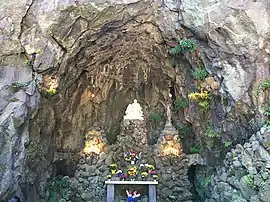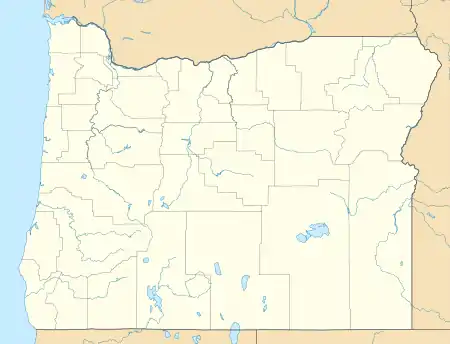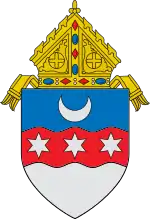The Grotto
The National Sanctuary of our Sorrowful Mother, popularly known as The Grotto, is a Catholic outdoor shrine and sanctuary located in the Madison South district of Portland, Oregon, United States. Constructed in 1924, the sanctuary covers 62 acres (25 ha),[2] set both at the foot of, and atop, a 110 foot (34 m) cliff. It is a ministry of the Servite Friars, Order of Friar Servants of Mary. A large meditation hall whose main chamber is at clifftop level extends down to the foot of the cliff; the cross on the hill is visible many miles away. In addition to a church, there are several thousand feet of trails, including a trail of the Stations of the Cross, along which visitors may pass in contemplation through botanical gardens. The Grotto also features a full-service Conference Center, and a Gift Shop.
| The National Sanctuary of our Sorrowful Mother | |
|---|---|
| The Grotto | |
 The Grotto shrine, featuring the Pietà | |
  | |
| Type | Shrine, garden, sanctuary |
| Location | 8840 NE Skidmore St Portland, Oregon, U.S. |
| Coordinates | 45.5533°N 122.5734°W |
| Area | 62 acres (25 ha) |
| Created | 1924 |
| Founder | Ambrose Mayer |
| Operated by | Order of Friar Servants of Mary |
| Visitors | 300,000 (annually)[1] |
| Designation | National Sanctuary |
| Religious Affiliation | Catholic (Friars of the Order of the Servants of Mary) |
History
The Grotto was established in 1924 by Friar Ambrose Mayer, a native of Ontario, Canada, who was sent to the United States where he was a Servite pastor for the Archdiosese of Portland, Oregon.[3] Upon moving to Portland, Mayer found acreage located outside Northeast Portland that was at the time owned by the Union Pacific Railroad Company, and had been put up for sale to be developed into residential property. Mayer made a downpayment of $3,000 and purchased the property in 1923.[3][4]A national campaign raised the balance of the funds needed to pay for the land.[5]
Mayer envisioned The Grotto as a natural cathedral, and construction began in September 1923. A cave was carved out of the 110-foot basalt cliff, and a statue of Mary holding Jesus's crucified body was installed.[3] Several years later, a marble recreation of Michelangelo's Pietà was also installed. Three thousand people gathered for the first mass at the Grotto on May 29, 1924.
In 1955, the Chapel of Mary was dedicated on the grounds, and in 1983 the Grotto was designated as a National Sanctuary.[3] The grounds of the Grotto include 62 acres[6] of pathways, forest, and an upper-level botanical garden situated above the cliff, which are accessed through an elevator built against the cliff wall.[7] The upper botanical gardens also provide expansive views of the Columbia River Valley, the Cascade Mountains, and Mount St. Helens.[8]
Vandalism
On November 30, 2012, unknown vandals broke into the grounds and vandalized multiple statues.[9] Statues depicting St. Joseph and baby Jesus were beheaded, and a statue of the Virgin Mary was toppled over and also had its head removed.[9] All of the statues were made of centuries-old Carrara marble.[9] Two angel statues were also damaged.[9] The statues have since been replaced or restored.
Features
_-_41.JPG.webp)
- Plaza Level
- Meditation Chapel[16]
- shrines[17]
- Lithuanian Wayside Shrine
- Our Lady of Częstochowa Polish Shrine
- Dambana, Filipino Faith Shrine
- Our Lady of Guadalupe Shrine
- Our Lady of La Vang Shrine
- Peace Garden[18]
- Mysteries of the Rosary[19]
- Monastery[20]
- Rose Garden[21]
- St. Anne's Chapel[22]
- Via Matris[23]
_-_28.JPG.webp)
Sculptures
The Smithsonian Institution has 23 statues and memorials registered at The Grotto:[24]
- Glorious Mysteries
- John Fitzgerald Kennedy Memorial
- Joyful Mysteries
- Kneeling Angels
- Lithuanian Wayside Shrine
- Marilyn Moyer Meditation Chapel Fountain
- Our Lady of Lourdes
- Peace Pole
- Pietà with Two Angels
- Sacred Heart
- Sacred Heart Shrine
- Saints in Niches
- Sorrowful Mysteries
- Sorrows and Joys of St. Joseph
- St. Joseph
- St. Jude Shrine
- St. Philip Benizi
- Stations of the Cross
- Statue of Mary
- The Assumption of Our Blessed Mother
- The Calvary Statue
- The Christus
- Via Matris
Events
There are various events at The Grotto throughout the year, as well as meetings and seminars. Every December The Grotto puts up a huge light display along its trails. The first annual "Festival of Lights" first took place in 1988[2] and lasted for ten nights. It has since been expanded in scope and duration, and the 2015 festival ran for 33 days. Besides the light displays, there are nightly concerts, caroling, and other family-oriented entertainment. More than 60,000 people attended the Festival each year.[2]
Monastery
The Grotto's 1936 monastery houses friars of the Servite Order.[25]
References
- "The Grotto". The Oregon Encyclopedia. Retrieved November 1, 2015.
- Bingham, Larry (November 23, 2012). "Grotto festival grows but preserves mission". The Oregonian. p. B2. Retrieved December 2, 2014.
- "Our History". The Grotto. Retrieved October 31, 2015.
- Graves, James (December 30, 2013). "Sanctuary provides refuge for seekers of peace, consolation". Our Sunday Visitor. Retrieved November 1, 2015.
- Olson, Donald (2014). The Pacific Northwest Garden Tour. Timber Press, Inc. p. 40. ISBN 978-1-60469-451-2.
- Gerald, Paul (2012). Peaceful Places: Portland: 103 Tranquil Sites in the Rose City and Beyond. Menasha Ridge Press. pp. 64–65. ISBN 978-0897329385.
- "Spring at the Grotto. Have You Taken the Elevator Up?". The Grotto. October 20, 2015. Retrieved November 1, 2015.
- Burgess, Ann Carol; Rutenberg, Linda (2003). Secret Portland, Oregon: The Unique Guidebook to Portland's Hidden Sites. ECW Press. pp. 105–106. ISBN 978-1550225860.
- Staff (November 30, 2012). "Religious statues beheaded at Portland Grotto". KGW. Retrieved May 4, 2016.
- Chapel of Mary
- The Grotto
- Stations of the Cross
- Statues
- Upper Level Gardens
- Map Upper Gardens
- The Grotto Meditation Chapel
- Shrines at the Grotto
- The Peace Garden
- Mysteries of the Rosary
- The Monastery
- The Rose Garden
- St. Anne's Chapel
- Via Matris
- "Collections Search: The Grotto Portland". The Smithsonian Institution. Retrieved November 1, 2015.
- "The Monastery". The Grotto. Retrieved September 27, 2014.
External links
| Wikimedia Commons has media related to The Grotto (Portland, Oregon). |
- The Grotto (official website)
